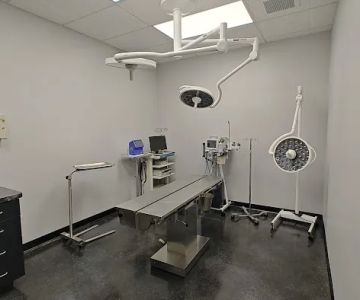How to Become a Veterinary Surgery Technician: Your Step-by-Step Guide
- Step 1: Understanding the Role of a Veterinary Surgery Technician
- Step 2: Education and Training for Veterinary Surgery Technicians
- Step 3: Gaining Experience and Certifications
- Step 4: Exploring Job Opportunities and Career Growth
If you're passionate about animals and interested in playing a crucial role in their medical care, becoming a veterinary surgery technician might be the perfect career for you. As someone who has always been fascinated by animal health and surgery, I can tell you that this path is not only rewarding but offers a unique opportunity to work in a fast-paced and fulfilling environment. In this article, I’ll guide you through the essential steps of how to become a veterinary surgery technician, from understanding the role to finding your first job in this field.
Step 1: Understanding the Role of a Veterinary Surgery Technician
Before diving into the educational requirements and career path, it’s essential to understand what a veterinary surgery technician does. Veterinary surgery technicians assist veterinarians during surgeries and medical procedures. They handle a variety of tasks, including preparing the operating room, assisting with anesthesia, monitoring the animal during the procedure, and providing post-surgery care. In essence, they are crucial members of the veterinary surgical team, ensuring the animal’s safety and comfort throughout the procedure.
The work of a veterinary surgery technician can be physically demanding and emotionally challenging, as it requires precision, attention to detail, and the ability to work with animals under pressure. However, the rewards of knowing that you’re helping animals recover and leading healthier lives are unmatched. It’s a field that requires both technical expertise and a deep passion for animal welfare.

AZ, 12020 S Warner Elliot Loop # 101, Phoenix, AZ 85044, USA
See DetailsStep 2: Education and Training for Veterinary Surgery Technicians
The path to becoming a veterinary surgery technician typically begins with formal education. You’ll need to complete an accredited veterinary technician program, which usually results in an associate degree in veterinary technology. These programs offer a comprehensive curriculum that includes courses in animal anatomy, surgical procedures, anesthesia, pharmacology, and medical terminology. Additionally, you’ll learn practical skills that you can apply in a clinical setting, such as how to prepare surgical instruments, monitor vital signs, and assist during surgery.
Many veterinary surgery technicians also take courses that focus on specific areas of surgery, including orthopedic surgery, soft tissue surgery, and emergency procedures. While some programs offer general training, others allow you to specialize in veterinary surgery. This specialization can provide a competitive edge in the job market, as veterinary clinics often prefer technicians with surgical training.
It’s important to note that accreditation is crucial when choosing a veterinary technician program. Look for programs accredited by the American Veterinary Medical Association (AVMA), as these are recognized by the industry and provide the necessary training for your certification exams. Online programs are also available, but be sure to choose one that offers hands-on clinical training to gain the practical experience required to excel in this field.
Step 3: Gaining Experience and Certifications
Once you’ve completed your education, gaining hands-on experience is essential to becoming a skilled veterinary surgery technician. Many programs include externships or internships, where you can work alongside experienced technicians in a veterinary clinic or animal hospital. These experiences provide valuable opportunities to apply your knowledge in real-world situations and develop essential skills in a controlled setting.
In addition to experience, certification is a crucial step in advancing your career as a veterinary surgery technician. While certification requirements vary by state, many employers prefer or even require certification from a recognized body, such as the Veterinary Technician National Exam (VTNE) and the Academy of Veterinary Surgical Technicians (AVST). Certification demonstrates your competence in the field and can increase your chances of landing a job and advancing in your career.
During my journey to becoming a veterinary surgery technician, I found that the combination of education, experience, and certification opened doors to numerous job opportunities and higher pay. It’s essential to stay up-to-date with continuing education and specialized certifications as the field of veterinary surgery evolves.
Step 4: Exploring Job Opportunities and Career Growth
Once you’ve completed your education and obtained the necessary certifications, it’s time to start looking for job opportunities. Veterinary surgery technicians can work in a variety of settings, including animal hospitals, veterinary clinics, research labs, and animal shelters. Some technicians even find work in specialty practices, such as emergency care or veterinary surgical centers. The demand for qualified veterinary surgery technicians is growing as more pet owners seek advanced medical care for their animals.
One of the great things about this career is the potential for growth. With experience, you can advance to supervisory roles, become a surgical supervisor, or even specialize in certain types of surgery, such as orthopedics or neurology. You may also have the option to become a veterinary technician educator or trainer, teaching future technicians in schools or training programs.
As the field continues to grow, new opportunities are constantly emerging. Many veterinary surgery technicians also choose to work with animal research teams, contributing to advancements in veterinary medicine. With the right combination of skills, experience, and certifications, you can build a rewarding and dynamic career that makes a significant impact on the lives of animals and their owners.
In conclusion, becoming a veterinary surgery technician is a journey that requires education, hands-on experience, and a passion for helping animals. By following these steps and committing to your personal and professional growth, you can enter a field that offers both job security and the opportunity to make a difference in the lives of countless animals. If you’re ready to take the first step, consider enrolling in an accredited program and begin your path toward becoming a highly skilled veterinary surgery technician.










